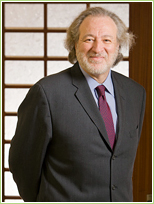
William Breitbart, M.D. is Chief of the Psychiatry Service, Interim Chairman, and Attending Psychiatrist, Department of Psychiatry & Behavioral Sciences, Memorial Sloan-Kettering Cancer Center, New York, NY. Dr. Breitbart is also Attending Psychiatrist, Pain & Palliative Care Service, Department of Medicine at Memorial Sloan-Kettering Cancer Center and Professor of Psychiatry at Weill Medical College of Cornell University
A graduate of the Albert Einstein College of Medicine at Yeshiva University, Dr. Breitbart is board-certified in Internal Medicine, Psychiatry, and Psychosomatic Medicine. He received both a Clinical Fellowship (1985-86) and a Career Development Award (1986-89) from the American Cancer Society. He was a Soros Faculty Scholar of the Open Society Institute, Project on Death in America (1995-1998). Dr. Breitbart was a founding member of the American Psychosocial Oncology Society (APOS) and the International Psycho-oncology Society (IPOS). He was President of the Academy of Psychosomatic Medicine in 2007, and is Immediate Past President of the International Psycho-oncology Society. He was a member of the Board of Directors of the American Pain Society and is a member of the International Association for the Study of Pain. He was a panel member for the American Psychiatric Association Guidelines for the Management of Delirium, and the AHCPR Cancer Pain Management Guidelines. Dr. Breitbart served as a member of the NIH Behavioral Medicine Study Section for 15 years.
Dr. Breitbart's research efforts have focused on psychiatric aspects of palliative care and have included studies of interventions for anxiety, depression, desire for death and delirium in cancer and AIDS patients. Other research efforts include investigating the neuropsychiatric problems of HIV-infected patients, including pain, fatigue and other symptoms. Most recently, Dr. Breitbart has developed novel psychotherapy interventions aimed at sustaining meaning and improving spiritual well-being in the terminally ill. Dr. Breitbart has had continuous NIH RO1 funding of investigator initiated research since 1989. Dr. Breitbart received the 2003 Research Award from the Academy of Psychosomatic Medicine, the 2007 Donald Oken Award from the American Psychosomatics Society, and the 2008 Lifetime Achievement Award from the Society for Liaison Psychiatry. He is the 2009 recipient of the Arthur Sutherland Lifetime Achievement Award for the International Psycho-oncology Society. He is the 2009 recipient of the Willet F. Whitmore Award for Clinical Excellence, Memorial Sloan-Kettering Cancer Center. Dr. Breitbart was the recipient of the Thomas Hackett Award for Lifetime Achievement from the Academy of Psychosomatic Medicine. He is the 2013 recipient of the Jimmie Holland Award from the American Psychosocial Oncology Society.
Dr. Breitbart has published extensively on the psychiatric complications of cancer and AIDS with 125 peer review publications and over 150 chapters and review papers. In addition, Dr. Breitbart has edited 7 textbooks including Psychiatric Aspects of Symptom Management in the Cancer Patient, published by the American Psychiatric Press, Psycho-oncology - 1st and 2nd Editions(co-editor with Dr. Jimmie Holland) and Handbook of Psychiatry in Palliative Medicine- 1st and 2nd Editions (co-editor with Dr. Harvey Chochinov) both by Oxford University Press, and Psychosocial Aspects of Pain: A Handbook for Health Care Providers (co-editor with Dr. Robert H. Dworkin) by IASP Press. Dr. Breitbart is currently writing a textbook on Meaning-Centered Psychotherapy for Oxford University Press. Dr. Breitbart is Editor-in-Chief, of Cambridge University Press’ international palliative care journal entitled, “Palliative & Supportive Care”. Dr. Breitbart also helped found IPOS Press, the publications arm of the International Psycho-oncology Society.
精神社会的緩和ケアのゴールとしての死の受容
要約
最適な緩和ケアのゴールを示し、痛みや身体症状のコントロールに焦点をおくことよりもっと望ましい緩和ケアに焦点を拡げるためにある症例を紹介しよう。これは緩和ケアの中の精神医学的、精神社会的、スピリチュアル的、実存的な領域も含み、最終的には患者が死を受容するということに到達することも含んでいる。死の受容の意味が明確にされ、あらゆるその複雑性について検討を加えてみたい。穏やかな様子で予後を認識できる患者では、抑うつ状態になるものは少なく、良好な「死の質」やアドバンス・ケア・プランニングを持ち、家族の悲嘆の問題もほとんどないことが証明されているというエビデンスを示そうと思う。
緩和ケアにおける実存的目標全体のことや、新しい精神社会的介入のことを述べてみたい。この介入は、緩和ケア医が患者と共にこのような目標に向かうことの手助けになるようなツールとして役にたつものである。
(邦訳:小池和彦)










